Dear Friends,
On the occasion of Sri Aurobindo’s 119th Birth Anniversary, All India Radio Pondicherry had brought together at 8 p.m. on August 12, 1991, five inmates (Nirodbaran Talukdar, Arabinda Basu, K.D. Sethna alias Amal Kiran, M. P. Pandit and Jhumur Bhattacharya) of Sri Aurobindo Ashram to broadcast enlightening words on the Master’s manifold achievement. We are happy to offer their short yet significant speeches to our readers. Our acknowledgements are due to Shri Pradeep Sen who organized the broadcast.
With warm regards,
Anurag Banerjee
Founder,
Overman Foundation.
________________
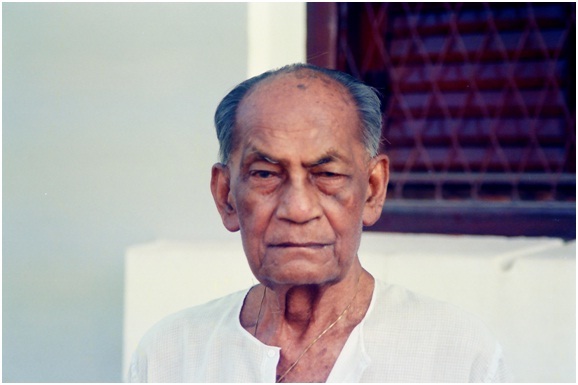
SRI AUROBINDO : THE POLITICIAN
Sri Aurobindo’s role as a politician was momentous since it was in the crucial initial period of India’s struggle for freedom. Let me begin with its background. At the age of 7 he was sent to England by his father with instructions to his ward to keep him from contact with anything Indian. But at the age of 11, when still in England, he received a strong impression that great revolutionary changes would take place in the world and that he was destined to play a part in them. His attention was now drawn to India and at Cambridge he made revolutionary speeches at the Indian Majlis. To fulfil his father’s wish he appeared successfully in the I.C.S. examination except that he deliberately managed to fail in the riding test. This saved him from service to the British rulers.
Returning to India at the age of 21 he joined the Baroda State service. But secretly he formed a revolutionary organization with its centre in Bengal. In a famous letter to his newly-wed wife he wrote that he adored India as a divine Mother-Spirit and to fight for her freedom was all in all to him. Resigning his lucrative post in Baroda he went to Bengal and joined Bepin Pal’s journal Bande Mataram, writing fiery articles in it that stirred the whole of India. The Government arrested him. Poet Tagore wrote a poem to him beginning with words which, translated, mean: “Aurobindo, Rabindranath bows to you.” He was released for want of sufficient evidence.
He now organized the Nationalist Party. To the dismay of the Moderates who then constituted the Congress he openly declared complete independence as India’s political goal. After crushing the Moderates at the Surat Conference his party developed a programme of non-cooperation, passive resistance, boycott of foreign goods, Swadeshi, etc. with Bankim Chandra’s song, “Bande Mataram” (“I bow to you, O Mother”) as India’s national anthem. Most of this programme was later taken up by Gandhi. The Government again arrested Sri Aurobindo. He spent a year in Alipore Jail as an undertrial prisoner. There he immersed himself in Yogic practice and had the realization of Sri Krishna as present everywhere. Sri Krishna assured him that he would be released. And released he was, to everyone’s surprise. It was also at an inner command by Sri Krishna that he suddenly left Calcutta for Chandernagore in French India and then for Pondicherry. There he lived to the end and created his Ashram of Integral Yoga.
However, he never forgot his motherland and worked spiritually for her freedom. In 1935 I asked him whether in his future scheme of things India’s independence formed a part. He replied that this was quite settled: his concern was with what would follow. To quote his words: “goonda raj or Bolshevik raj?”
During World War II he had insight into Hitler’s evil designs and took the side of the Allies while Indian leaders launched a non-cooperation campaign. Then came the Cripps Proposals. Sri Aurobindo read in them a genuine prelude to independence. But the Congress rejected his appeal to accept them. Later several Congressmen regretted the refusal. Independence came in 1947—on August 15, a birthday of Sri Aurobindo. Sri Aurobindo saw in it the Divine’s sanction to his work for his country. The All India Radio asked for a message. After referring to the significant coincidence, he listed his five dreams: (1) a united unpartitioned India; (2) a resurgent Asia; (3) a world union; (4) India’s gift of spirituality to the world; (5) a new step in evolution to a more-than-human Consciousness.
Question: Could you recollect the memories of 15th August 1947?
I was not actually present at that time; but I heard that the Mother had come on the small terrace near her room [Dyuman’s terrace] and devotees had collected below. They began singing Bande Mataram with Dilip Kumar Roy at the centre. Then in the end the Mother hoisted the national flag and the Ashram flag and cried “Jai Hind!”
Nirodbaran
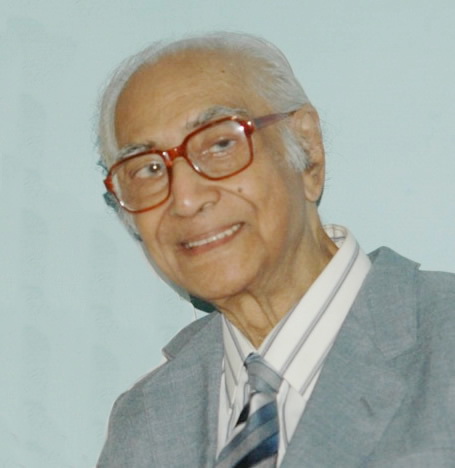
SRI AUROBINDO : THE PHILOSOPHER
Sri Aurobindo’s philosophy is unique in its originality in the history of spiritual thought. Its originality consists mainly in four ideas.
First, God has manifested the world in his own being by his inherent Conscious Force, but he is not manifest in it. Rather he is veiled in all the principles of existence including the most obscure, viz. Matter. God as Substance, Consciousness and Force has evolved from Matter as Life and Mind.
Secondly, man, the mental being, consciously seeks knowledge of and union with the supreme Reality. But all experiences and realizations of mental-spiritual man are partial, not integral as is evident from the tenets and values of the different religions and the strands of the various spiritual disciplines and their results. Sri Aurobindo emphatically asserts that the integral realization is possible and will surely be attained.
Thirdly, the acceptance and commitment to life in the world not as it is now but as it will be as the result of a further unfolding of consciousness in the world.
Fourthly, Sri Aurobindo says there will be a further evolution of consciousness to a still unmanifest level of itself. He calls this level of consciousness the supermind. Integral and comprehensive Knowledge, omnipotent and infallible Will and pure self-creative Bliss are the essence of the supermind. It is the divine Nature.
The evolution of mental man’s consciousness will enable him to know, be and possess God in all his aspects both beyond and in the world. The ascent of man to the supermind and its descent into his being and nature will bring about a radical change within, a true transformation. His mind will not cling to particular truths but will open itself to the integral Truth, his vital life will shed its passions and attachments and enjoy God in all its experiences, Matter organized as the physical body of man will become fully conscious and arrive at God.
God has a purpose in the world. It is his unveiled manifestation on earth and in individual and collective life there. The supermind is the indispensable means of achieving that purpose. It will fulfil the intention of the Divine in his creation. The supramental spiritual being will live his life in Knowledge and from the Truth of the Spirit. The members of the community of supermen will enjoy a divine existence and their life will be the Life Divine.
Arabinda Basu
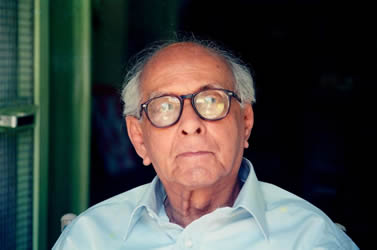
SRI AUROBINDO : THE POET
Sri Aurobindo was a poet on a grand scale, the scale natural to all the sides of his versatile personality. He has given us poetry of various kinds—several narratives, numerous lyrics and sonnets, half a dozen dramas, a substantial body of experiments in new metres and, to top everything, an epic of nearly 24,000 lines of blank verse, the longest poetic creation in English: Savitri, a Legend and a Symbol.
This poem takes up the famous traditional story of a woman’s love which manages to reclaim from the God of Death the life of her prematurely dead husband. Sri Aurobindo turns that Indian legend to his own spiritual purposes without depriving it of human interest. He transforms it into a symbol of conquering all the ills that attend on man’s mortality. But the vision unfolded goes beyond a mere individual’s perfection. A democracy of the Divine, liberating the human collectivity, is the goal as in that utterance by the story’s main character:
A lonely freedom cannot satisfy
A heart that has grown one with every heart:
I am a deputy of the aspiring world,
My spirit’s liberty I ask for all.
What is specially notable about Sri Aurobindo’s epic is that it attempts to open up a new dimension of poetic expression. In English literature we have the Shakespearean accent of the thrilled rapid life-force, the Miltonic tone of the majestically thinking mind, the deep or colourful cry of the idealistic imagination as in Wordsworth and Shelley and, recently, Yeats and A.E. Savitri, while taking into itself the whole past of English poetry, adds not only the Indian spirit: it adds also in ample measure the typical intonation, at once intense and immense in its rhythmic significance, which the Rigveda, the Upanishads and the Gita bring. Sri Aurobindo calls it “overhead poetry”. It is not what the common man may suppose: poetry that passes clean over his head! It is inspired verse with an illuminating power, hailing from secret regions of a more-than-human consciousness which lie above the mental level reached so far by earth’s evolution. This poetry may be generally characterized, in Sri Aurobindo’s own words from Savitri, as consisting of
The lines that tear the veil from Deity’s face.
If you want to relish variously such lines which the Rishis of old called the Mantra, the supreme vibrant Word, I may offer a few samples. In the exquisite vein you have:
A gate of dreams ajar on mystery’s verge.
The note of sheer sublimity is struck by
Our life’s repose is in the Infinite.
A music goes home to our human concerns with the whisper of an ultimate assurance when Sri Aurobindo says:
All can be done if the God-touch is there.
K. D. Sethna
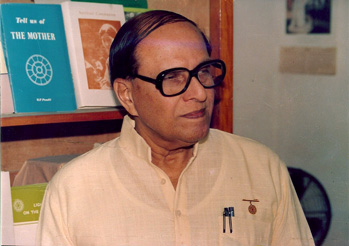
SRI AUROBINDO : THE YOGI
Sri Aurobindo had many facets to his personality, but the most central one which holds the key to his life is that of a Yogi. His Yoga, as is well known, is a new approach to life: it includes all life in Yoga.
Question: Is the Yoga of Sri Aurobindo for the sake of humanity?
I would say Yes and No. Yes, because it aims at the fulfilment of God’s intention in humanity. No, because its aim is not confined to the betterment of the state of humanity. It aims at raising the level of human life into a divine state.
Question: What has one to do to prepare oneself for Yoga?
First to fix an aim for one’s life. Normally people carry on without any central aim; a central objective has to be fixed and then all the faculties of oneself have to be gathered and focused on this objective which in this Yoga is to realize the Divine Consciousness. In other words, one has to make an effort to raise all the movements of daily life to a higher level which corresponds to the requirements of a divine life.
Question: What are the main characteristics of Sri Aurobindo’s Yoga?
It is this integral character. It concentrates not only on the health of the soul but also on the health of the mind and the life-energies and the physical body. It embraces the whole of life in its perspective.
Question: How is the present generation influenced by the Yogic life of Sri Aurobindo?
For the first time in Indian tradition, Yoga has been turned earthwards. It accepts life, seeks to improve and perfect life and not to reject life. It is this positive note in Sri Aurobindo’s approach that has appealed to the rising generation in our country.
M. P. Pandit
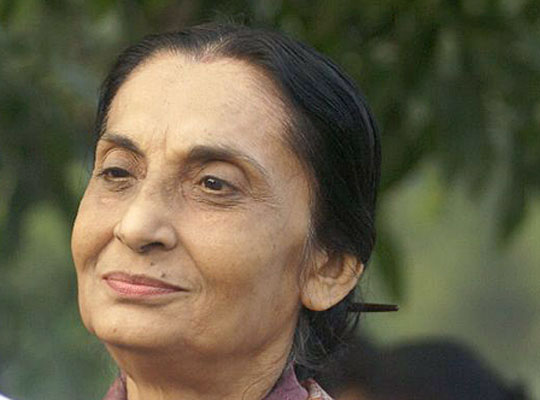 SRI AUROBINDO : THE EDUCATIONIST
SRI AUROBINDO : THE EDUCATIONIST
Question: What is the main objective of the Sri Aurobindo International Centre of Education?
In the vision of Sri Aurobindo and the Mother, education is a discipline and a training that begin at birth and continue throughout one’s life. They believe in the perfectibility of man, of his whole being, and thus education consists in the full and perfect manifestation of all the possibilities lodged within his body, his life, his mind. It should provide him with the ideal opportunities that will help him realize all his potentialities. “The human being,” says Sri Aurobindo, “is a self-developing soul, and the business of both parent and teacher is to enable and to help the child to educate himself, to develop his own intellectual, moral, aesthetic and practical capacities and to grow freely as an organic being, not to be kneaded and pressured into form like an inert plastic material… The true secret is to help him find his deeper self, the real psychic entity within.” Thus, education should not only bring out of the child the best and the noblest he is capable of, but also endow him with an understanding of the true aim and significance of human life.
Sri Aurobindo describes this in very simple words when he says: “The children should be helped to grow up into straightforward, frank, upright and honourable human beings, ready to develop into divine nature.”
For life is a process of evolution, an evolution of consciousness. This consciousness emerges progressively and can manifest itself through all the activities of the different parts of the being. The teacher helps the child to discover these possibilities within him. He is a helper and a guide who shows him how to perfect his instruments of knowledge and how to acquire knowledge for himself. He does not teach, he only helps the child to discover the knowledge hidden within. Everyone has within himself something divine and the chief aim of education is to help the growing child to draw that out and manifest it fully, joyfully and harmoniously. “A free and natural growth is the condition for genuine development,” according to Sri Aurobindo. The human personality is encouraged to grow and exercise all its capabilities, the physical, the vital, the mental and moral, the aesthetic and the spiritual. The evocation of this real man within is the right object of education, indeed of all human life.
The future clearly demands the development of the larger possibilities of the human personality. Our education looks ahead to the future. It seeks to break out of the arbitrary grooves of training and preordained and compulsory shaping of thought and personality. This aim is expressed in the Students’ Prayer which the Mother wrote out in 1952:
“Make of us the hero warriors we aspire to become. May we fight successfully the great battle of the future that is to be born against the past that seeks to endure, so that the new things may manifest and we be ready to receive them.”
Question: To what extent are the students influenced by Sri Aurobindo’s vision?
To assess the extent is rather arbitrary, for it is an opinion about their inner life, and unless I am identified with them and become them, I cannot really know what their experience is. But this much is sure that they are all exposed to Sri Aurobindo and His thought, their consciousnesses are stamped by His vision. All of them do not take to the spiritual life as such, after they have completed their studies, but they do develop a sense of values where each aspect of life—the material, the emotional, the mental and moral—is viewed in the light of the truth of the Spirit. They are all aware that theirs has been a living education, an education in which the process of growth is never over. They do not see themselves merely as living bodies with certain vital propensities, an ego and a reason that is trained to satisfy these propensities: in short, they do not see themselves as reasoning animals but as growing souls.
This process makes them more aware of themselves. Each of them is an individual, but behind the diversity they feel the oneness. One of the fundamental aspects of the teaching of Sri Aurobindo is the essential unity upholding the diversity of the manifestation. Each is an expression of the All, and, as Sri Aurobindo explains, while each searches for perfection through the development of his powers, he also feels out, though more slowly, after a similar perfectibility of the race. Sri Aurobindo also adds: “The only true education will be that which will be an instrument for this real working of the spirit in mind and body of the individual and the nation…” “It enables the individual to grow, the nation to preserve, enrich and strengthen its soul and raise both into powers of the life and ascending mind and soul of humanity.”
Jhumur Bhattacharya
________________
one of the finest posts Anurag for 75th anniversary of SAICE and Nirodda’s new book ‘talks in SAICE” makes the most comprehensive history of the ashram , from 1910 -20,1st vol, 2nd vol 1920-30..
When – approximately, Beni ?
Thanks for a great post Anurag !
Dear Anurag, The teaching of Sri Aurobindo is a radical change of our consciousness, transformation of our being and nature in the light of supreme and not to abandon but live in the world as a perfect being. The yoga is integral which encompass not a part but all parts of our being. It is necessary to unite with the Divine, act instrument of the Divine according to His Will. I strongly believe that everything is possible with our conscious effort and opening us to the Force of the Mother.
Wonderful find! Thank you
Wonderful recollections from a galaxy of truly worthy persons / personalities – who knew exactly what they were speaking about – every word is a stamp of authenticity and devotion – there is certain flow of flawless remembrances of certain facets of One whom we adore – ” When to the sessions of sweet silent thought , I summon up remembrances of things past – so uttered Shakespeare and so spoke these persons of substance –
Surendra s chouhan – SAICE ’69
Dear Anurag, The teaching of Sri Aurobindo is a radical change of our consciousness, transformation of our being and nature in the light of supreme and not to abandon but live in the world as a perfect being. The yoga is integral which encompass not a part but all parts of our being. It is necessary to unite with the Divine, act instrument of the Divine according to His Will. I strongly believe that everything is possible with our conscious effort and opening us to the Force of the Mother.
thank you so much for you inspiring work
Such a bunch of tributes to the universal aspects of a rare genius.
You deserve our deepest admiration.
A great and timely upload of Sri Aurobindo’s thought and teachings. Thanks for enlightening us before Guru’s birthday.